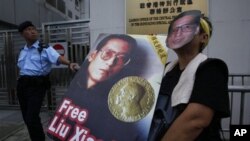The approach of the 1997 handover of Hong Kong from Britain to China prompted many observers to say economic trade would wither in the historically vibrant city. The assessment has proved to be premature, if not completely incorrect. Our reporter has more on Hong Kong's current role in Asian and global trade.
Hong Kong remains a thriving international financial center, ranking just behind London and New York. Speaking at the private Brookings Institute in Washington, William Overholt, a senior research fellow at the John F. Kennedy School of Government at Harvard University, says Hong Kong's stock market grew even in the midst of the global financial crisis.
"The reality is that, in new issues, during the crisis, China, and especially Hong Kong, surged ahead of the New York Stock Exchange in new listings, so Hong Kong issues about 50 percent more stock than the New York Stock Exchange," said William Overholt. "NASDAQ is still substantially bigger. You put the Chinese exchanges together and they're now ahead of London and New York. As is so often with the conventional wisdom, the perception that going back to China would damage Hong Kong is exactly the opposite of reality."
But, he says Hong Kong is not a leader in every financial sector.
"If you look at bond markets, it is a completely different story," he said. "Asian bond markets are large in countries where the government issues a lot of debt. Hong Kong does not have any debt so it lags behind places like Tokyo and Seoul. It is going nowhere in bonds until a Chinese corporate bond market develops."
Hong Kong's legal system remains essentially the same as it did under British rule. Overholt says that has attracted many companies from mainland China into the Hong Kong market.
"They want to operate under capitalist laws, they want to operate under an international legal system, they want to gain experience for their international operations, and they want Hong Kong analysts covering their companies," said Overholt. "So, you have had this enormous wave of Chinese companies listing in Hong Kong and, as a result, instead of being primarily a property market, which was the case up until almost 1997, Hong Kong now has tech companies and construction companies and mining companies and nine of the largest listed companies in Hong Kong are from the mainland now."
Michael Martin is a specialist in Asian Affairs of the Foreign Affairs, Trade and Defense Division of the Congressional Research Service. He says the influx of mainland Chinese firms has also brought some tax evasion problems.
"There are a number of mainland companies that attempt to use Hong Kong to circumvent oversight in the mainland," said Michael Martin. "They basically move their money into Hong Kong through various means in order to avoid supervision in mainland China."
William Overholt says the attraction of Hong Kong is so strong because of the ability for companies to freely deal in international trade.
"There is a freedom of action, a freedom of dealing with money," he said. "There is the security of dealing with international legal systems, whose rules are acknowledged. The contracts are acknowledged back in the mainland when you have got an overseas listing. So, these guys would like to be able to make money under predictable rules and with minimal political interference. It is not very different from capitalists anywhere. They want to be capitalists. They like making money."
Donald Tong is Hong Kong's Commissioner for Economic and Trade Affairs. He says easy access promotes Hong Kong's thriving trade.
"Tourists, external investors, and economies also play a key role in fostering our external relations with other economies," said Donald Tong. "At present, citizens from about 170 countries and territories around the world, including the U.S., enjoy visa-free access to Hong Kong."
And, he says, U.S. corporate presence continues to keep Hong Kong's trade strong.
"While many overseas companies may have chosen to go directly into mainland China, a large number of overseas companies have chosen to establish or extend their presence in Hong Kong," he said. "In 2008, there were over one million Americans visiting or residing in Hong Kong."
Tong adds that, despite Hong Kong's small geographic size, it ranked 11th among leading world traders in 2009 with 2.7 percent of the world's total trade. In 2009, the value of Hong Kong's total merchandise trade amounted to $666 billion, or 316 percent of Hong Kong's gross domestic product.
Hong Kong Remains a Strong Global Economic Center





